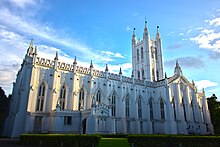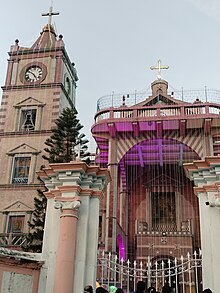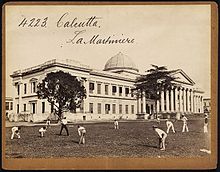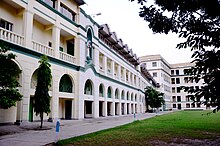Christianity in West Bengal
| Part of a series on |
| Christianity |
|---|
 |



Christianity in West Bengal, India, is a minority religion. According to the 2011 census of India, there were 658,618 Christians in West Bengal, or 0.72% of the population.[1] Although Mother Teresa worked in Kolkata (Calcutta), Christianity is a minority religion in Kolkata as well. West Bengal has the highest number of Bengali Christians. Bengali Christians have been established since the 16th century with the advent of the Portuguese in Bengal. Later in the 19th and 20th centuries, many upper-class Bengalis converted to Christianity during the Bengali Renaissance under British rule, including Krishna Mohan Banerjee, Michael Madhusudan Dutt, Anil Kumar Gain, and Gnanendramohan Tagore. Aurobindo Nath Mukherjee was the first Indian to be Anglican Bishop of Calcutta.
Bengali Christians have the highest literacy rate, the lowest male-female sex ratio, along with better socio-economic status.[2] Christian missionaries run major social institutions dealing with education and healthcare, such as those run by the Jesuit Catholics, and the dominant Protestant Church of North India (CNI), & some Christian Revival Church also serving.
History
[edit]Christianity has been present in Bengal since the 16th century. The Portuguese established a settlement in Bandel, Hooghly district in the 16th century, and Bandel Church, perhaps the first church in West Bengal, was built in 1599.[3] Burnt down during the sacking of Hooghly in 1632, the church was rebuilt in 1660. The followers of Christianity mainly settled in Barddhmann, Bankura, Kolkata and Hooghly district of West Bengal. Many Bengali Catholics have Portuguese surnames.[citation needed]
British missionary William Carey, who founded the Baptist Missionary Society, travelled to India in 1793 and worked as a missionary in the Danish colony of Serampore, because of opposition from the East India Company to his activities in their regions. He translated the Bible into Bengali (completed 1809) and Sanskrit (completed 1818). His first Bengali convert was Krishna Pal, who renounced his caste after conversion.[4] In 1818, the first theological college in Bengal, Serampore College, was founded.
Denominations
[edit]St. Paul's Cathedral, Kolkata is the seat of the Anglican Diocese of Calcutta (1813) of the Church of North India. The Roman Catholic ecclesiastical province which has its seat in the Cathedral of the Most Holy Rosary is the Roman Catholic Archdiocese of Calcutta (1834).
Other denominations include:[5]
- Assemblies of God in India
- India Pentecostal Church of God
- Armenian Apostolic Church
- Bethel Apostolic Assemblies(IBAA) India Archived 20 January 2022 at the Wayback Machine
- Bengal Orissa Bihar Baptist Convention
- Brethren in Christ Church in India
- Church of God (Anderson)
- Council of Baptist Churches in Northern India
- El Shaddai
- New Life Fellowship Association
- United Missionary Church of India
- Christian Revival Church (CRC)
Population
[edit]| Year | Number | Percentage |
|---|---|---|
| 2001[6] | 515,150 |
0.64
|
| 2011[7] | 658,618 |
0.72
|
| # | District | Total population | Christian population | % |
|---|---|---|---|---|
| 1 | Jalpaiguri | 3,872,846 | 186,279 | 4.81% |
| 2 | Darjiling | 1,846,823 | 141,848 | 7.68% |
| 3 | South 24 Parganas | 8,161,961 | 66,498 | 0.81% |
| 4 | Kolkata | 4,496,694 | 39,758 | 0.88% |
| 5 | Nadia | 5,167,600 | 33,835 | 0.65% |
| 6 | North 24 Parganas | 10,009,781 | 26,933 | 0.27% |
| 7 | Dakshin Dinajpur | 1,676,276 | 24,794 | 1.48% |
| 8 | Paschim Medinipur | 5,913,457 | 23,287 | 0.39% |
| 9 | Barddhaman | 7,717,563 | 21,220 | 0.27% |
| 10 | Murshidabad | 7,103,807 | 18,102 | 0.25% |
| 11 | Uttar Dinajpur | 3,007,134 | 16,702 | 0.56% |
| 12 | Maldah | 3,988,845 | 13,209 | 0.33% |
| 13 | Birbhum | 3,502,404 | 10,906 | 0.31% |
| 14 | Haora | 4,850,029 | 8,666 | 0.18% |
| 15 | Puruliya | 2,930,115 | 8,646 | 0.30% |
| 16 | Hugli | 5,519,145 | 7,300 | 0.13% |
| 17 | Koch Bihar | 2,819,086 | 4,122 | 0.15% |
| 18 | Bankura | 3,596,674 | 3,865 | 0.11% |
| 19 | Purba Medinipur | 5,095,875 | 2,648 | 0.05% |
| West Bengal (Total) | 91,276,115 | 658,618 | 0.72% |
| Census year | % of total population |
|---|---|
| 1951 | 0.70% |
| 1961 | 0.59% |
| 1971 | 0.57% |
| 1981 | 0.59% |
| 1991 | 0.60% |
| 2001 | 0.64% |
| 2011 | 0.72% |
Notable Institutions
[edit]

Schools
[edit]- Armenian College and Philanthropic Academy (Armenian Apostolic Church and Orthodox)
- Assembly of God Church School (Pentecostal and Protestant)
- Calcutta Boys School ( Thoburn Methodist church)
- Calcutta Girls High School ( Thoburn Methodist church)
- Don Bosco High & Technical School, Liluah (Salesian and Catholic)
- Don Bosco School, Park Circus (Salesian and Catholic)
- Don Bosco School, Bandel (Salesian and Catholic)
- La Martiniere Calcutta (Church of North India and Protestant)
- Loreto Schools, Kolkata (Catholic)
- Scottish Church Collegiate School (Church of North India and Protestant)
- St. James' School (Church of North India and Protestant)
- St. John's Diocesan Girls' Higher Secondary School (Church of North India and Protestant)
- St. Lawrence High School, Kolkata (Jesuit and Catholic)
- St. Teresa’s Secondary School, Kolkata (Roman Catholic)
- St Thomas School, Kolkata (Church of North India and Protestant)
- St. Xavier's Collegiate School (Jesuit and Catholic)
- The Frank Anthony Public School, Kolkata (Non-denominational and Protestant)
Colleges and Universities
[edit]- Loreto College, Kolkata (Catholic)
- Scottish Church College (Church of North India and Protestant)
- Senate of Serampore College (University) (Non-denominational and Protestant)
- Serampore College (Non-denominational and Protestant)
- South Asia Theological Research Institute (Non-denominational and Protestant)
- St. Paul's Cathedral Mission College (Church of North India and Protestant)
- St. Thomas' College of Engineering and Technology (Church of North India and Protestant)
- St. Xavier's College, Kolkata (Jesuit and Catholic)
- Women's Christian College, Kolkata (Non-denominational and Protestant)
Notable people
[edit]This article's list of people may not follow Wikipedia's verifiability policy. (December 2020) |
- Mother Teresa
- Henry Derozio, poet
- Brahmabandhav Upadhyay, theologian
- Badal Sircar, noted Bengali playwright and dramatist.
- Neil O'Brien
- Leander Paes
- Leslie Claudius
- Derek O'Brien
- Michael Madhusudan Dutt
- Toru Dutt
- Kali Charan Banerjee
- Krishna Mohan Banerjee
- Harendra Coomar Mookerjee
- John Sharat Chandra Banerjee
- Sukumari Bhattacharji, Indologist
- Lionel Protip Sen, General in the Indian Army
- K. P. Aleaz, theologian and retired Professor, Bishop's College[10][11]
- Bonita Aleaz, political scientist[12]
- Enrico Piperno, tennis player(1982 Asian Games), India's former Davis Cup and Fed Cup coach.[13][14][15]
- Joy Govinda Shome, theologian and founder of Calcutta Christo Samaj in 1887.
- Lisa Nandy, is of Bengali descent is the Secretary of State for Culture, Media and Sport in Government of the United Kingdom, Labour MP for Wigan
See also
[edit]References
[edit]- ^ Population by religious community: West Bengal. 2011 Census of India.
- ^ Indian Christians Treat Their Women Better, Sex Ratio Highest
- ^ Roma Bradnock, Footprint India, Footprint Travel Guides, 2004, ISBN 1-904777-00-7, p. 584.
- ^ "Short Account of the Conversion and Baptism of Kristno Paul". The American Baptist Magazine, and Missionary Intelligencer. 1 (2): 65–67. March 1817.
- ^ World Christian Encyclopedia , Second edition, 2001 Volume 1, p. 368-371
- ^ "Total population by religious communities". Censusindia.gov.in. Archived from the original on 19 January 2008. Retrieved 20 November 2014.
- ^ "Indian Census 2011". Census Department, Government of India. Archived from the original on 13 September 2015. Retrieved 25 August 2015.
- ^ Population by religious community: West Bengal. 2011 Census of India.
- ^ B.P. Syam Roy (28 September 2015). "Bengal's topsy-turvy population growth". The Statesman.
- ^ Inbuon, Carey Lal Lawmawma. Life and Contribution of Kalarikkal Poulose Aleaz (K.P. Aleaz) in the Theology of Relions (Thesis).
- ^ "K. P. Aleaz". Open Library. Retrieved 18 May 2021.
- ^ "BONITA ALEAZ | University of Calcutta - Academia.edu". caluniv.academia.edu. Retrieved 18 May 2021.
- ^ "Enrico Piperno: Indian tennis players in top-50 is nearly impossible: Piperno". The Times of India. 5 February 2017. Retrieved 18 May 2021.
- ^ "Calcutta's South Club: The long-forgotten home of India's tennis history". ESPN. 1 February 2019. Retrieved 18 May 2021.
- ^ "ITF Enrico Piperno Overview". www.itftennis.com. Archived from the original on 18 May 2021. Retrieved 18 May 2021.
